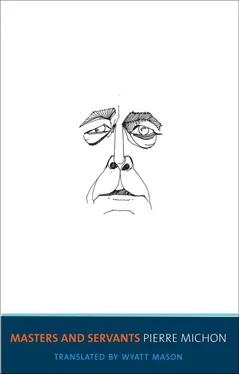Pierre Michon - Masters and Servants
Здесь есть возможность читать онлайн «Pierre Michon - Masters and Servants» весь текст электронной книги совершенно бесплатно (целиком полную версию без сокращений). В некоторых случаях можно слушать аудио, скачать через торрент в формате fb2 и присутствует краткое содержание. Год выпуска: 2013, Издательство: Yale University Press, Жанр: Современная проза, на английском языке. Описание произведения, (предисловие) а так же отзывы посетителей доступны на портале библиотеки ЛибКат.
- Название:Masters and Servants
- Автор:
- Издательство:Yale University Press
- Жанр:
- Год:2013
- ISBN:нет данных
- Рейтинг книги:3 / 5. Голосов: 1
-
Избранное:Добавить в избранное
- Отзывы:
-
Ваша оценка:
- 60
- 1
- 2
- 3
- 4
- 5
Masters and Servants: краткое содержание, описание и аннотация
Предлагаем к чтению аннотацию, описание, краткое содержание или предисловие (зависит от того, что написал сам автор книги «Masters and Servants»). Если вы не нашли необходимую информацию о книге — напишите в комментариях, мы постараемся отыскать её.
Masters and Servants — читать онлайн бесплатно полную книгу (весь текст) целиком
Ниже представлен текст книги, разбитый по страницам. Система сохранения места последней прочитанной страницы, позволяет с удобством читать онлайн бесплатно книгу «Masters and Servants», без необходимости каждый раз заново искать на чём Вы остановились. Поставьте закладку, и сможете в любой момент перейти на страницу, на которой закончили чтение.
Интервал:
Закладка:
This for ten years. His hour came, that little hour when he said to himself, at around thirty years of age: Well then, maybe I’ll be Mengs, with God’s help. God helped him in the unexpected form of a man whom you do not remember, Señora, but who long ago had been a painter, very much of the court, and who would have been more so had he not wasted his time being jealous of his shadow; a man who, upon meeting the little fatso, found him inoffensive, took an interest in him and decided to push him before the world, as a foil and as a valet; yes, God put someone in Goya’s path who was more smug than Tiepolo the Younger, more silver-tongued than a Neapolitan, and more useless than Mengs— the great Francisco Bayeu.
ABOUT THAT, THIS LITTLE TOSS of loaded dice, we know everything that one can know, because poor Josefa told us about it, or she kept so quiet about it that she said just as much, Josefa Goya, née Bayeu; Josefa with her meagre little braid rolled into a bun at the nape of her neck, her hair that was neither exactly blonde nor precisely red, and her other ambivalent features, her weak smile and her kind eyes; Josefa who gave him forty years of her life until death, her own, and to whom were given the alms of a single small portrait of her, one in forty years — this portrait, which she kept devoutly, which I saw in her room, and before which she was sitting with her hands clasped in front of her and with the same timid smile that the portrait captured, clasped hands and timid smile, perhaps thanking God for this miracle, or excusing herself for her immodesty: he had painted her once, with the same colors and the same hand, he who painted the queen and the cardinal dukes, infants and their toys; Josefa whom he called Pepa and who was as necessary to him as the big brush from Lyon and the smoky black that filled backgrounds and that one didn’t notice but that were the painting, were space, without which the richly brocaded princes of the foreground might as well disappear into nothingness; Pepa whom perhaps he loved, as she didn’t dare say and didn’t dare think, whom he knocked up ten times for nothing, except that one time when little Javier was born, Javier who wasn’t to rush double-time to join his brothers and sisters in the grave, lifeless despite their perfect forms, completed like some painting, who ended up rotting away like their father’s paintings; mother of all these little cadavers and of Javier’s living body, Javier who was smug and who was doted on by his father, who had his own son Mariano — who was even more smug, if that’s possible, and was adored by his grandfather; Josefa, the despised sister of Francisco Bayeu, who passed into the hands of a Francisco Goya who really wanted her, in the middle of July, in the middle of Madrid, or almost — in the little church of Santa Maria in a Madrid suburb.
She did not say that she was happy, Pepa, on this 25th of July. But telling of it twenty-five years later still made her blush, not as you blush, Señora, but the way unassuming blondes are wont to, self-effacing themselves to featurelessness, confused by their pleasure and its manifestation, then losing that pleasure for others having seen it, such that the recollection of their joy is so insignificant, since this great, departed emotion prompts no envy from others, is barely of interest, is but a simulacrum of comprehension, is pity; they’re used to it, these self-effacing blondes, they talk about it. So she told us how happy he had been, him, her Francisco, this 25th of July, wearing his pearl gray morning coat à la française that was a little tight on him, certainly too small, but that made him look taller, and not as fat as they said, but chubby cheeked, yes, like a child, and like a child enjoying everything, getting married, seeing a magpie fly over Santa Maria when the bells began to ring, the little children of honor all in red who were getting tangled up in their bouquets of white gladiola, in their little approximations of the motions of men, and these round eyes they suddenly have, these tears they spill who knows why — because a cloud passed over the sun, because the step to the square is too high to reach, because the world doesn’t stop at the instant of their joy. He was like them, Pepa said. And if he was delighted, it wasn’t because he was joining the Bayeu clan, as spiteful gossips call it, by some mix of calculation and barbarism; it wasn’t because he was now nearly in Madrid, at its very gates; it wasn’t because he suddenly became — as if by the touch of a magic wand, by the taking of a poor girl’s virginity— the brother-in-law of Francisco Bayeu, the king’s painter, Mengs’s favorite disciple and his assured dauphin, sharp tongued and omnipresent, incapable, strong; and it wasn’t because on the same occasion, in the same bag, he became brother-in-law to Ramón and Manuel Bayeu, no less painters and no less incapable, but milder, with duller features and duller wills, long since stuck in the gloomy palette of Bayeu-le-Grand, foils both of them and errand boys, of a certain sort; “No,” said Pepa, “this is all just malicious gossip: he was happy to enter into my brother’s family, that is true, but it was because he liked him, my brother, whom he admired and listened to talk about painting — he knew everything, my brother — and my fiancé still had a few things to learn. He was, perhaps, also happy to marry me, but that, I don’t know.”
Just look: they’re leaving Santa Maria, on this beautiful July morning in Madrid, when the heat is already building, but is still young. Their tricornes are in their hands; Bayeu is wearing a deep brown morning coat and ochre yellow breeches, he is just behind Goya and, since he’s taller, he puts a hand on Goya’s shoulder and gestures at the fine weather. The two look up, and all of this charms them as much as it does us: painters surround them and even some counts, the embroidered vests of majos , great blue sashes spanning ducal chests à la française , liveries more manifest than their coats of arms, a thousand dresses, this one à la française , that one in maja; and up above, bells are leaping, delicate monsters of heavy bronze that are to the ear what flowers are to the eyes, and just like flowers they turn their heads modestly but unfailingly to greet the great, immodest dome of the sky; fans and tricornes too are flowers, says Bayeu, leaning on Goya’s shoulder. But what’s this? Is the groom frowning, and what is the bride about to shout? What’s happening suddenly, Señora, above these nuptials? A shower? In the middle of July, when the skies were just so clear? It can’t be that God is angry, as they say; he doesn’t bother with us any more, he wouldn’t show his face now. And it can’t be the Inquisition swooping down with pyres and carts, sanbenitos and thunderous, chanted Latin exhortations; the Inquisition is nowhere in this storm, of course. Where is this execrable grandeur that is falling on their heads coming from? Whose poor brushwork is this? Tricornes are rising into the Boreas, and it isn’t the wind that has taken them, they are climbing, blackly, toward all this black so within reach, with a flap of wings they are there, because the sky is no higher than the shortest of Santa Maria’s spires, such strange birds flying above, and you say, now, that it’s a death knell we hear? And the poor guests on the stone steps, how helpless they seem, everything falling from their hands, everyone bending to pick things up, bending, pits of shadow falling across their faces, their brutish chins, their fleshy ugliness, their beastly mouths, Señora, that twist and turn outward, deepening, displaying teeth and tongues, they are past speech, not from some ugliness of the soul, no, it’s not hunger or lust — in this weather! — and not fear because they knew that the gust of wind would come: it’s sorrow, Señora, it’s such sorrow. The sky weighs on their shoulders like a great sack. We bear it as best we can. And what now? Who has killed this woman, bound on the steps, head dangling down? And the water running over her hiked skirts, on her unfortunate face, in her hair, neither blonde nor red, on her meagre belly from which Javier won’t come, from which ten little corpses and semi-corpses won’t either. Bayeu and his brothers, his friend Zapater, the dukes, the old master gilder who came jubilantly from Saragossa in his Sunday best — all these Nebuchadnezzars around her on all fours, who graze and who are painters, who graze and who are dukes, who above all certainly are crying, but how can you tell in all this rain. It must be the wind that felled them, come now, it’s not madness, it’s not wickedness. Is it them? Go see. They all look alike; you can’t tell who’s devouring whom. But the little fatso over there who’s running away down the lane wearing his pearl gray morning coat, dripping wet, dripping beneath the cloudbursts like the palette of some slob, this tubby imp exulting beneath the gush from the rain gutters, it seems that we recognize him, his kindness, his joie de vivre , his modesty, and the big knife in his skirts. A knife, where? In any case, not in the hands of Francisco Goya who turns while smiling toward Francisco Bayeu and says: yes, flowers, everywhere, fans and white mantillas blooming like hawthorns, toy dogs, majos and their ponytails and the buckles on their breeches, red bows on the Swiss tricornes, women’s hands budding phalanx upon phalanx as though petal to petal, and look, brother, these little children all in red watching us with their eyes so clear, as though they’re posing for us: he’s exaggerating, of course, as usual, but that’s a small sin. Come on, it was just a dream. A bizarre dream that came to me. Without them, life would be a bad dream. No, it’s beautiful out, look closer, Señora, all is quiet in the church square, everyone is gleaming with color and joy, a perfect sky out of Tiepolo is above them, deep, far: the Creator made all this blue and he left nothing there for us to retouch. Thus we may marry in a pearl gray morning coat, we may have sons. Nothing need be repeated. And the white and the black of the magpie sitting in a tree in Santa Maria Square, frozen— its beak suspicious and sharp, its eyes round and clearly drawn, this white and this black are so clearly delineated by such majestic lines, white feather against black feather, in careful little strokes, never blending together, never blending into the leaves either, nor into the big blue leaves high above. Goya watches this magpie.
Читать дальшеИнтервал:
Закладка:
Похожие книги на «Masters and Servants»
Представляем Вашему вниманию похожие книги на «Masters and Servants» списком для выбора. Мы отобрали схожую по названию и смыслу литературу в надежде предоставить читателям больше вариантов отыскать новые, интересные, ещё непрочитанные произведения.
Обсуждение, отзывы о книге «Masters and Servants» и просто собственные мнения читателей. Оставьте ваши комментарии, напишите, что Вы думаете о произведении, его смысле или главных героях. Укажите что конкретно понравилось, а что нет, и почему Вы так считаете.












